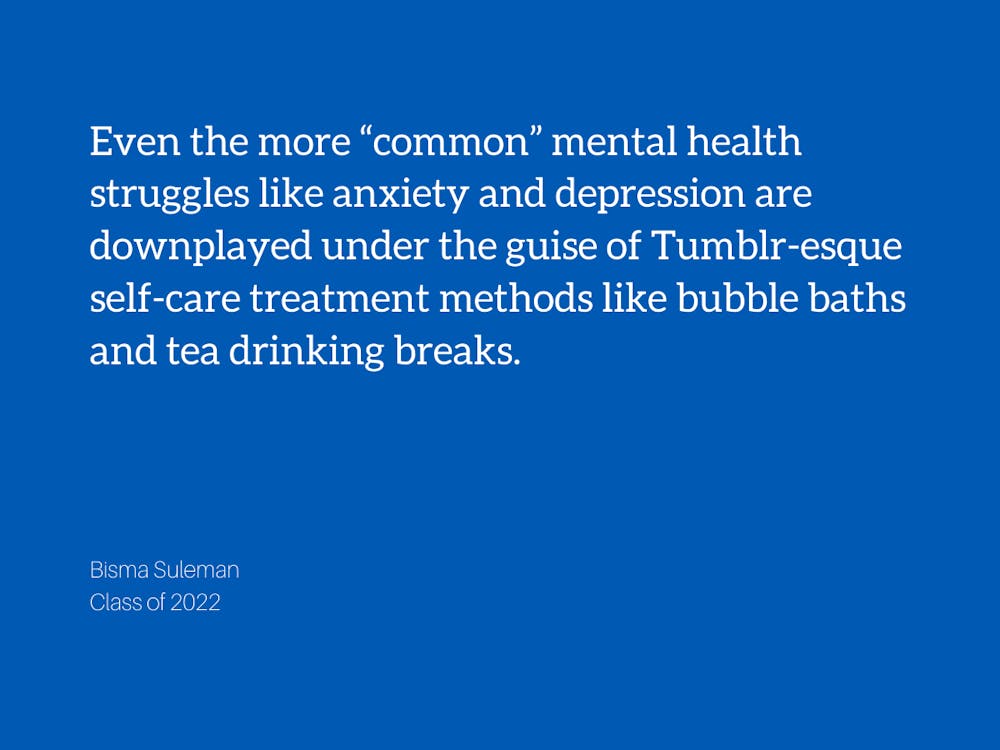Say what you will about the Duke Confessions Facebook page, but one thing’s for certain: the page sure knows how to evoke a variety of emotions in response to the deepest, darkest thoughts of our fellow Blue Devils. As the page has continued to grow in popularity over the last few months, there’s been no shortage of confessions involving wistful declarations of love, a unified distaste for computer science assignments, interpersonal comparisons of class load and work ethic, and of course, it wouldn’t truly be an elite university’s confessions page without a splash of casual racism and pretension.
Many times over, I’ve been proud to be privy to the genuinity of my fellow classmates’ thoughts. But by the same token, there have been times I’ve rolled my eyes so far back in my head I thought they just might get stuck there.
However, recently I had come across a confession that truly struck me out of left field: “I wish self harm and bipolar/personality disorders were more accepted. Other mental health like anxiety and depression get all the attention, but if you harm yourself or have bpd people sorta think you're crazy.”
Upon reading this line, I wanted to jump out of my seat and let out screams of joy. I wanted to hurriedly nod my head in shocking agreement, to grab hold the edges of my computer screen and hug it close to my chest because finally, finally someone was saying it!
The conversations surrounding mental health at Duke are so largely saturated by the “less taboo” sides of mental illness. How often do you hear about serious conversations or advocacy methods around here about the “other” sides of mental illness? You know, the real, ugly sides that result in days or weeks spent in bed missing countless classes and message inboxes full of unanswered emails from professors, deans, counselors, you name it.
How often do you hear about those living with bipolar disorder on campus and what that even means—how it is so much more than “mood swings” or whatever version of it you’ve seen in Netflix movies? How often do you hear about schizoaffective disorder, OCD (and no, I am not talking about being “organized”), C-PTSD, psychosis, personality disorders like Borderline PD, suicidal thoughts, self-harming behaviors, eating disorders and the restricting and binging and the subsequent shame that follows and how lonely it all feels because no one really wants to talk about the dark, ugly sides of any of this.
Even the more “common” mental health struggles like anxiety and depression are downplayed under the guise of Tumblr-esque self-care treatment methods like bubble baths and tea drinking breaks.
I was so elated to read that confession on the Facebook page, and at the same time I was frustrated because of how true it was. Because a thought I hold so close and dear to me, that I think about nearly everyday at Duke, was finally said under the barrier of anonymity. And maybe that lack of anonymity is why I was so scared to like or comment on the confession. I worked up the courage to do it anyway, because what’s the point of thinking this, writing this, attempting to highlight any sort of flaw in mental health rhetoric at Duke if I couldn’t even unashamedly stand beside those who feel the same way?
I am proud that mental health advocacy is becoming more apparent on campus, but it is insulting when the awareness is constantly limited to the “tame” side of mental health rather than the actual difficult symptoms and behaviors caused by severe mental illness. Mental illness is a lot more than ambiguously vacuous mantras of “mental health matters” on a poster and happy-go-lucky notes handed out around the B.C. Don’t get me wrong, such methods of advocacy are impactful and carry the potential to truly make someone’s day just a little bit better. Sometimes a passing uplifting message from a stranger can make the difference between a good and a bad day. But for those groups and individuals wishing to bring awareness of mental health on campus: let’s not delude ourselves into pretending that incessant kumbaya sessions of highly filtered, tip-toed conversations and writing feel-good cliches on sticky notes are doing anything more than trivializing the seriousness of mental illness.
So to the person who wrote that confession: I want you to know that I hear you and I agree with you. We need constructive discussions on campus about mental illness, mental health treatments, and access to resources for a variety of diagnoses. Wholesome wellness efforts have their own benefit, but they ultimately reinforce stigmas surrounding mental illness because of their lack of focus on the realities of facing mental illness every day.
Let’s have our mental health awareness efforts involve less sticky notes and more honesty.
If you are experiencing depression and need support, please call the National Depressive/Manic-Depressive Association Hotline at 1-800-826-3632 or the Crisis Call Center’s 24-hour hotline at 1-775-784-8090.
Bisma Suleman is a Trinity sophomore. Her column, “insane in the membrane,” runs on alternate Fridays.
Get The Chronicle straight to your inbox
Signup for our weekly newsletter. Cancel at any time.

